Peter MALONE
Saturday, 09 October 2021 13:01
Decline, The/ Jusqu'au declin

JUSQU’AU DECLIN/ THE DECLINE
Canada, 2020, 83 minutes, Colour.
Real Bosse, Guillaume Laurin, Marie- Evelyne Lessard, Marc Beaupre, Marc-Andre? Grondin, Marilyn Castonguay Isabelle Giroux.
Directed by Patrice Laliberte.
The Decline is the first Netflix film made in Québec. It is a brief film, a kind of psychodrama, a portrait of survivalists.
The film opens dramatically with a family trying to escape from their home with supplies – only to find that it is a rehearsal for the real thing if and when it happens. The father of the family watches a television program where a leading survivalist is giving instructions how to preserve food. He then travels out into the snow clad forests and wilderness in order to participate in a survivalist program.
The leader is admired, an expert on survivalist techniques, setting up his home and headquarters, paths in the forest with traps, another building with supplies in time of crisis. The attitude of the team is very gung ho as latest participate in exercises, shooting – until a hunting accident and the whole atmosphere changes. Dilemmas is has to whether to conceal what has happened, or the risk of exposing them all to police. Different attitudes, different decisions, some violent confrontations and an tense sequence when one of the party is trapped under ice.
Underlying the action are questions about the mentality of the survivalists and of the leader and his behaviour, something of a cult leader.
1. The title? Survivalists? The quest? The accident? The decline?
2. A film from Québec? The city of Montréal, homes, streets? The transition to the country, the snow, the forest, the centre for the survivalists? The musical score?
3. The opening, the family, the haste in escaping, the drive? And timing the escape? The rehearsal? The family collaborating?
4. The sense of menace, of some kind of collapse in society? The means for survival? Antoine and his watching Alain on the television, supplies food? Antoine and his admiration for Alain?
5. Antoine driving out into the countryside, Alain meeting him, the blindfold, the ride over the snow, the compound, the tent and the accommodation, the main centre, the explanation of all the suppliers, self-sufficient, poultry, crops, trees…?
6. The introduction to the group, the different personalities, for men and two women? Some military backgrounds?
7. Alain, age, experience, his beliefs? Tough and demanding? The training for survival and its intensity?
8. The various activities, the weapons, hunting, in the woods, the booby-traps on the paths? The central store for refuge?
9. The interactions of the group, the audience getting to know each of them, their own backgrounds?
10. Francois, the hunting, the accident, his death? The reactions of each? Concern? The issue of going to the police? Guilt and blame? Fear?
11. The arguments, the rights and wrongs, justice? Sleeping on the decision? Alain and his burning the body and the equipment?
12. The group taking sides, David and his militarism, supporting Alain? Helene and her wanting to leave, the police, David and his brutality? Alain shooting her leg? Their leaving her, her death?
13. The three going away, on the path, Sebastien and the trap? Antoine and Rachel, their characters, persevering though pursued, finding the store, the ammunition? The escape, on the frozen river, Rachel and the ice, Antoine and his initiative, the difficulty in cracking the ice, rescuing Rachel? Warmth, her recovery? The weapons? Persevering, reaching the car, and one shot?
14. Rachel, surviving, with the gun, confronting David, his weapon? His being wounded? Rachel bashing him?
15. Alain, on the vehicle, Rachel returning to the house? The eventual confrontation, the fight and her strength, eventually overcoming Alain?
16. Rachel, surviving, going back to the city?
17. The moral of this kind of story of survivalists activity, the mentality of those participating, attitude towards society?
Published in Movie Reviews
Published in
Movie Reviews
Saturday, 09 October 2021 13:01
Hogar/ The Occupant
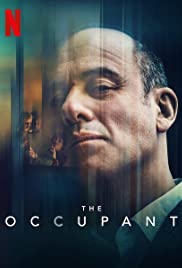
HOGAR/THE OCCUPANT
Spain, 2020, 103 minutes, Colour.
Javier Gutierrez, Mario Casas, Bruna Cusi, Ruth Diaz.
Directed by David Pastor, Alex Pastor.
The original Spanish title is more telling than the English version. The Spanish word, Hogar has overtones of hearth and home, being at home. With the English title, one can ask who is the occupant, the advertising man who continues to return to the apartment that his had to leave or his friend his family now occupies the apartment.
This is a film about a middle-aged man losing his job, relying on his reputation as an advertising agent in the past (the film opening with his bright and breezy commercial about family life in the 1990s). He now is told he is too qualified for jobs. This has some devastating effects, discussions with his wife, moving out of the apartment, trying to relate to his son who is involved in studies but is putting on too much weight, the proposal to sell the family car. He also tries for another advertising job but is humiliated by being offered a contract to work six months’ probation without pay.
The man goes into a church and then joins a help-group and their discussions, making contact with a friendly man, going out to coffee with him, but Spending a story about having an ex-wife and an alienated daughter.
The irony is that the new friend is occupying his old apartment. Initially, the situation is friendly, being invited to dinner, meeting his friend’s wife and daughter, but then asking his friends help after he crashes his car. There are also complications with blackmail by the local gardener – leading to more desperate action by the advertising man.
Perhaps the audience has been suspicious about the advertising man’s behaviour – but, from this point on, he is quite sociopathic, alienating his wife and son and leaving, deceiving the friend’s wife about her husband’s behaviour, insinuating himself into her life and that of her daughter. This eventually leads to violence (setup by the advertising man).
Some of the commentary on the film consists of surprise that there is no retribution for this sociopath after we have seen his destruction of his own family, his killing his friend, becoming part of the friend’s family and taking his job. While his wife does try to confront him with the truth, he exercises financial power over her, threatening her.
Perhaps this is the point of the film, telling the story of the sociopath and leaving the audience amazed at what he has done and how he gets away with it.
1. The Spanish title? Home and hearth and all that it means? The English title – referring to whom?
2. The Barcelona setting, the city, business offices, affluent apartments, churches and church groups, the streets? The musical score?
3. The opening sequence, the ideal and happy family? The fact that it was a commercial? From the 1990s? The contrast between the commercial and reality?
4. The story of Javier? His background in advertising? His interview for the job? Audience empathy? The young executives acknowledging his reputation? Saying he was too qualified to work with them?
5. Javier and his distressed response? His relationship with his wife? Concern about his son, studies, putting on weight? His son’s and attitudes? The discussion about selling the apartment? Selling his car? His age and the prospects for a future job? His going to an old friend – and the contract that he work on probation for six months without pay? His decision to go to classes? An older person in the class, response? (And later going back to the class and his being ousted?)
6. HIs driving around in the car, not selling it? Offers by phone? His sacking the apartment cleaner, keeping the keys? His continually returning to the apartment, looking out the window? His not telling his wife the truth? Urging his son to go out running with him and the son exhausted?
7. Wandering the city? Going to the church? Joining the group? Their welcoming him, his eventually speaking, the friendly offer of Tomas, going with him to have a coffee, his spinning him a story about his ex-wife, his daughter and alienating her?
8. Tomas, with the group, his background in drinking, violent with his wife, his peanut allergy, his position in the transport company, subservient to his father-in-law? A sympathetic character? And the friendship with Javier? The invitation to dinner, the encounter with the gardener, the flowers? Javier crashing the car, texting Tomas, his coming to help? Javier manipulating his phone – and later using against Tomas with his wife?
9. The gardener, observing Javier, the flowers, phoning him, the blackmail, sex offender and Javier getting the panties, hiding from Lara in the apartment, the second meeting? Javier inserting the petrol and the gardener burning?
10. The gradual manifestation of sociopathic behaviour? Targeting Tomas, creating difficulties with his wife? Ingratiating himself with the wife? With the daughter? Taking her to the gymnastic rehearsals and the photo, sending it to Tomas?
11. Tomas, his wife accusing him, his defence, her being manipulated, his leaving?
12. Javier, going to the class because his wife followed him, going home, packing and leaving?
13. Javier and his buying the sprays, giving one to Tomas’s wife, Javier’s wife confronting him with the truth about the sprays?
14. Tomas, upset with his wife, her getting the spray, Tomas’s collapse, her phoning Javier, his return, changing the spray, choking Tomas?
15. The consequences, his becoming a father figure to Monica, Lara relying on him? Marriage, place in the firm, confidence of his father-in-law?
16. Javier’s wife, confronting him, the truth? His hold over her, the money for his son’s studies, his ownership of the apartment? His wife backing down?
17. Audience surprise at no retribution for Javier, for a sociopath to create his own story, ruthlessly destroying others – and getting away with it?
Published in Movie Reviews
Published in
Movie Reviews
Saturday, 09 October 2021 13:01
Mom and Dad
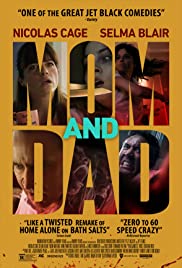
MOM AND DAD
US, 2017, 86 minutes, Colour.
Nicolas Cage, Selma Blair, Anne Winters, Zackery Arthur, Robert T.Cunningham, Lance Henriksen.
Directed by Brian Taylor.
The title seems so American. And, at the beginning, it seems very American, the basic American family in Middle America. Mom is Selma Blair. Dad is Nicolas Cage (and, perhaps, that should be a warning that there is violence and outrage to come).
In the early part of the film, all seems normal enough at home, relationships, the touches of conflict, touches of rebellion, but love and care. There are also expected sequences at school.
Whether it is a virus or some kind of mysterious presence, the parents are both infected and the result is that they turn against their children – in the most violent and repulsive way, taking more than a cue out of some of the violent films that Nicolas Cage was making at this time, often five titles a year.
What begins in domestic ordinariness culminates in an eerie sense of menace, the transformation of the parents, their persecution to their of their children, wanting to destroy them. (And, as something of a bonus, there is a cameo appearance by that veteran of similar kinds of films, Lance Henrikson.)
1. The title, the tone? Audiences expecting something folksy? Audiences expecting the opposite?
2. The American family, relationships between parents and children? Conflicts? Rebellions? Love and care? Exasperations?
3. The town, the homes, school, classrooms, assemblies? The streets? The final action confined to the home, the basements? The musical score?
4. Setting up the family, the father being very busy, playing with his children, asleep at his desk, moods, memories of the past in the car with the girl and the sex? The mother, devoted, her teenage daughter, contradictions? Love for the younger son? The relationship between the couple?
5. Carley, in her room, with her parents, wilful? Riley? The girl talk? Boys? The other girls in the class? The teacher, criticisms, confiscating phones? The relationship with Damon? His doing the exam, getting out early?
6. Kendall, the criticisms of her in-laws, her frustration at not having a career, her friend and their going to aerobics? The chat afterwards? Puzzling about her daughter?
7. The crisis, the mysterious origins of the crisis, media influence, television sets, the reporting of the news? Mass hysteria? The classroom, the phone call, the teacher letting the children out? The parents of the gate? The children massed in the courtyard, their trying to escape, leaping over the fence, Carly and her friend escaping? Going to her house, her mother arriving home, the TV news, her mother killing Carly’s friend?
8. Kendall, her concern, Brent, his coming home early? Josh, playful? The changing of the situation? Brent, his attacks, madness? Kendall trying to restrain him, her change?
9. The children, trying to escape, the threats, the violence, going to the basement, locking the door, means to preserve themselves? The parents, at the door, soars, implements, trying to get through?
10. The principle that only the parents were trying to kill their own children? Damon, his own father, his father’s attack? His coming to the house, attempts to help Carly, Brent and his attacks on him? Over the railing, his recovery?
11. The children, expressing their love for their parents? The parents and the menace, the threats, ingenuity?
12. The children getting the upper hand, tying up their parents, their talking to their parents – and the sudden ending of the film?
Published in Movie Reviews
Published in
Movie Reviews
Saturday, 09 October 2021 13:01
Sound of Silence, The
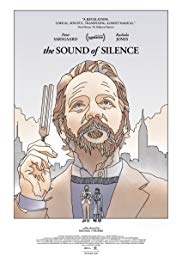
THE SOUND OF SILENCE
US, 2019, 85 minutes, Colour.
Peter Sarsgaard, Rashida Jones, Tony Revelori, Austin Pendleton, Bruce Altman.
Directed by Michael Tyburski.
This is a film which the general public would find very difficult. Its main appeal is to the arthouse audience, an audience who which want something different, something stimulating to reflect on.
Peter Sarsgaard plays what might be an eccentric genius or someone who is just eccentric – with some mental health problems.
We see him out and about in New York City, listening to sounds, sensing the different sounds in different neighbourhoods, mapping the city and its sounds. He is also available to clients who want to improve the sounds and atmosphere of their apartments or particular rooms.
One of his main clients is played by Rashida Jones, his working in her apartment, his forming an attachment to her.
Meanwhile, in the real world, Peter has an office and takes on an enthusiastic young apprentice, Tony Revelori. However, he is ambitious, is motivated by self-promotion and the possibility of making money, contacting a company who want to take over Peter and his work.
In the meantime, Peter has support from a Columbia University professor, Austin Pendleton, and tries to get some of his findings published. By this stage of the film, it is becoming clearer that Peter is definitely an eccentric, that his findings and methods are dubious, a magazine editor putting him off from publishing his work.
And, a sad ending, for Peter and the lack of possibilities for his future.
1. The title? The reality of noise, the reality of sound and sounds, the importance of silence?
2. The New York City setting, the areas, distinctive, their character?
3. The music and its importance?
4. Peter, his character, age, his story, dress, his tools, his work in the streets, the maps, his office? Sam and his working in the office? How would the invitation for discussion, the commercialisation of his work? His refusal?
5. His work in apartments, the various sounds in the apartment, their effect with each other, on the people? Changing implements and the effect? Success?
6. Ellen and her encounter, the discussions with Peter, the situation in her apartment? Personal? His visit, study of her apartment, the various rooms, her agreeing? The personal life?
7. Peter, his theories, the intensity of his understandings, his commitment to his work, to the city?
8. Various clients, their requests, his considering them, his work?
9. Sam, in the office, the data, his going to How would, selling the material? Peter seeing the advertisement in the street, his disillusionment?
10. The professor from Colombia, friendship and support? Meeting:?
11. The ending, the collapse of Peter’s work? The issue of his character, his mental health, his being a genius, but misunderstood? The encounter at the speech, with the editor of the magazine? Agreement for discussion about the rejection of his ideas?
12. Not a film for the popular audience – but asking for artistic appreciation?
Published in Movie Reviews
Published in
Movie Reviews
Saturday, 09 October 2021 13:01
Sun is also a Star
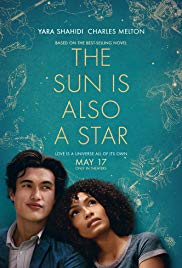
THE SUN IS ALSO A STAR
US, 2019, 100 minutes, Colour.
Yara Shahidi, Charles Melton, John Leguizamo.
Directed by Ry Russo- Young.
In a way, this is what Young Adult literature is about. The target audience is young men and women in their teens, young men and women in their 20s.
This is definitely a young Young Adult story which is a romance, yet full of regrets. It is also a story of the variety of the population of New York City, the various ethnic groups – in this particular case, from the West Indies and from South Korea.
Most of the action takes place over a day and a half. We are introduced to the two central characters, seeing them in their situations and in their families. Then there will be a chance encounter, one seeing the other from a distance and intrigued, then following, help in preventing an accident, then conversation.
She is a young woman from a West Indian family who have settled in New York. She loves science, is ambitious to be a scientist, wants to stay in the United States. However, her family are subject to deportation moves and she makes a number of efforts to prevent the deportation.
He is a young man from a Korean family, an enterprising father who has set up a hair business (telling us that this was very strong in Korea), with a loving mother and with a brother who is at great pains to become a tough American.
He sees her from a distance at Grand Central Station, and it is he who saves her from being knocked down by a car. She is on her way to an interview to get help from a lawyer to stop the deportation (a sympathetic John Leguizamo). He is on his way to an interview about his future, his father wanting him to study medicine while he himself wants to be a poet.
They become friendly, he challenging her to look into his eyes steadily for several minutes, telling her that it will have an emotional effect. They also have a visit to his father’s store and an encounter with his brother. They visit her family, involving packing, and her father is aggressively unsympathetic. And his appointment is put off till the next day so they have some time together.
And, as in romantic stories, they will encounter each other – both having appointments with the same lawyer. However, the future seems not to be…
There is an epilogue to the film five years later. The family has gone back to the West Indies and the young woman has continued her studies, eventually getting documents to enable her to return to the United States. He, in the meantime, writes poetry, recites his poetry to the customers in the restaurant that they had visited in the past.
She had loved the sun and had told the poet this – and, just as she goes out the door, read it in the restaurant in hope, regretting that the two of them had not met after all these years, as his poem about the sun. And… Is there a sequel? For Romantics and for realists, there should be a sequel!
1. Based on a young adult novel? The target audience? American, African-American?, Asian American? The West Indies? Worldwide?
2. New York City, the Jamaicans and their house, the Koreans in the house, the shop? The streets, the car accident, subway rides, buildings and offices, cafes? The musical score?
3. The introduction to Tash, her family and the story, her voice-over comments, the personal hopes for staying in the New York, studies and achievement? Her family to be deported, the reasons? Her reaction, search, determined, the phone calls, wanting the interview, the sympathetic secretary, the lawyer and his help?
4. Daniel, the Korean background, his strict mother, Charley wanting to be an American, the shop, the issue of hair and the Korean development of the business? The strict father and his expectations of Daniel? Daniel going to the interview, the issue of his being a doctor, not, his wanting to be a poet?
5. Danny and his friend at Grand Central, watching Tash, Deus ex Machina on her jacket, the gazing at the roof? The chase, in the subway, getting off, the car accident, his saving her life, the discussions, the bond?
6. Tash, the quotations from Carl Sagan and others, her attitude towards science, the wonder of the universe, the sun as a star, her interest in gathering data, analysis of data, scientific ambitions?
7. The contrast with Daniel, the poet, the song, his feelings, the issue of falling in love, his experience, the questions for Tash?
8. Her problems, the hour, extending to the day, their talk, Tash and her meetings, the issue of love? The experience of affection?
9. Going to the shop, the hand, Charlie and his brash American style, the strict father, welcoming Tash? Their time together, the growing intimacy?
10. The next day, the lawyer, offering some hope, but then the deporting? Daniel and his interview? Tash gatecrashing?
11. Daniel visiting Tash’s home, she saying he was her guest? The farewell – and the four-minute gaze into each other’s eyes?
12. The passing of five years, losing touch, Tash coming to the US, to go to Berkeley, the moon, study? Her search for Daniel? The lawyer at the cafe?
13. Her going out the door, her hearing the poem about the sun? Their being together? A future? A young adult story, joy and tears?
Published in Movie Reviews
Published in
Movie Reviews
Saturday, 09 October 2021 13:01
Harriet

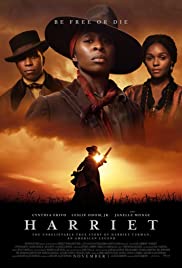
HARRIET
US, 2019, 125 minutes, Colour.
Cynthia Erivo, Leslie Odom Jr, Joe Allman, Clarke Peters, Henry Hunter Hall, Tim Guinee, Joseph Lee Anderson, Janelle Monae, Vondie Curtis- Hall.
Directed by Kasi Lemmons.
Perhaps the title does not strike a chord, not elicit memory. So, who is Harriet?
She is Harriet Tubman, one of the key African- American women in 19th century American history. To that extent, this film is a must for audiences throughout the United States. And it is important for non-Americans to experience something of the life of this woman, her courage, her causes, her commitment.
She is played by singer-actor, Cynthia Erivo (who made such an impression as the singer in Bad Times at El Royale and Widows), an Oscar-nominated performance (and something of a shock to discover that she was actually born in London).
Initially, Harriet was a young slave in a southern plantation, called Minty. The initial part of the film offers a portrait of life for the slaves on the plantation, their work, hardships, religious fervour, and the arrogant behaviour of the landowners, parent generation, younger generation.
Minty decides that she wants to escape and uses a great deal of ingenuity, local help and contacts, experiences of the dangers of pursuit, of the terrain, before she reaches the North, and finds a haven in the black community of Philadelphia. It is a new life for her and she chooses the name Harriet.
And that is only the beginning. A substantial section of the film involves Harriet, her return to the south, wanting to rescue her family members, setting up means for others to escape, accompanying them, succeeding, many escapees able to use the Underground Railroad. In fact, she gets such a reputation that she is feted in the media, condemned by the landowners in the South, out to capture her.
But, life is not easy. She is pursued,but continues her work, takes more public stances, challenges both black and white leaders in the North.
It is a wonder that we do not know more about her. Especially since she led an active group in an uprising during the Civil War. And, surprisingly, she did not die until 1913, a half-century after her participation in the war.
Well worth seeing, well written and acted, and a substantial reminder of the experiences of African- Americans in slavery and in freedom.
1. A piece of American history? Slavery? The history of slavery, in the American South? Issues of freedom? The underground railway? The Civil War? Legislation?
2. A portrait of Harriet Tubman in context, her life as a slave, growing up as a slave, dreams of escape, strong character, her own escape, life in Philadelphia, participation in the railway? Her own freeing of slaves? The Civil War?
3. The re-creation of the period, the plantations, the mansions, the fields, work in the fields? The countryside? The contrast with Philadelphia, in the early 19th century? Society? The boarding house? The dramatisation of the Civil War? The musical score, the Negro spirituals, the final song? Cynthia Erivo and her presence, performance, Oscar nomination, the final song?
4. The introduction to Minty? Her age, work, in the family house? The past with Gideon? Her marriage to John, his being a free man, the joy in getting the certificate, the hopes, the pastor’s rituals and his songs, the plantation owner tearing up the document? The mother and her place of the plantation? Gideon and his story, the past, the threats?
5. The importance of God in Harriet’s life, her career, language about God, the visions, being led? Changing her name to Harriet?
6. Her decision to escape, John and the possibilities, going to the Reverend, his advice, her not being able to read, listening to instructions, the country, her being pursued, the river, the decision to jump and to survive? Getting the contacts, going to visit them, further information, Philadelphia? Meeting with him Still, the welcome, Marie and her freedom, the boarding house, Harriet settling in, the bath? Bravery and determination?
7. The year passing, finding her place in society, the difficulties for escape, legislation Congress? The decision, to return, going south, the encounter with John, her love for him, the marriage, the news that she was dead, his marrying again? Her being distraught? Seeing her family? The decision for them to escape? The way, her leadership, the hesitation crossing the river, shown the way, God’s help, bringing them home? The acknowledgement of her work?
8. Her not being one to take advice, her going on various missions? The press reports and then naming her and her becoming Moses? Her success, the number of slaves escaping?
9. The posse being formed, the family and Gideon, the black tracker and Walter, wanting payments? Walter, associate, joining in, his watching Harriet, his change of heart, the line, his joining her help?
10. The railway, the people participating? The issue of getting to Canada?
11. The contrast with the family, the mother and her physical and mental collapse? Gideon’s life, the brothels? The owners gathering, rebelling against Moses? Accusing the family of causing the situation?
12. Harriet’s achievement, her success, her being inducted into the Society? That God gives her success? The underground railway? The leaders, the members, the initial meeting?
13. Her return, to get her parents, Walter and his help, the parents and their reaction, willing to go, the encounter with her sister? The dominance of the family over her sister? In the carriage, the driver and being mistaken for white? The carriage coming through? Gideon and the pursuit, the black man wanting to kill Harriet, shooting him? The confrontation between the two, the truth spoken, the rifle, Harriet not Gideon?
14. The Civil War, Harriet and her leadership, the rescue mission during the war?
15. Her death in 1913, 91 years, her place in American history, achievement?
Published in Movie Reviews
Published in
Movie Reviews
Saturday, 09 October 2021 13:01
Leunig Fragment, The
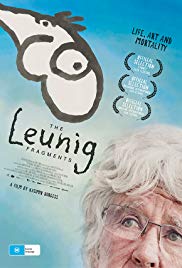
THE LEUNIG FRAGMENTS
Australia, 2019, 97 minutes, Colour.
Directed by Kasimir Burgess.
Michael Leunig has been an extraordinary presence in the Australian imagination for several decades. This is particular the case because of his prolific cartoons his immediately recognisable sketch style – appearing frequently in the pages of The Melbourne Age and The Sydney Morning Herald. He has a wry view of human nature, of the world, of the universe.
This is a portrait of Leunig rather than a biography – he often appears as a difficult character, unpredictable, with moods, and members of his family with the exception of one son were unwilling to participate.
The director, Kasimir Burgess, made contact with Leunig and was able to film the cartoonist over a period of five years, sometimes with long time lapses in between takes.
There are many talking heads who are most complementary about Leunig, especially the comic genius, the late John Clarke and Philip Adams some of the cartoonists provocations as “waspish�. However, there are also some remarks included by fans of his cartoons who find themselves not particularly moved by Leunig as a person. Some television personalities, like Virginia Trioli, are critical of some of the stances he has taken.
So, the film is in bits and pieces, something like a jigsaw puzzle, but not complete, many holes, many gaps. But there is enough material here, perhaps more than enough, about Leunig’s life and its effect on him, the development of his views, his characters, Mr Curley and the duck, the range of his art and style, some of the cartoons becoming alive in animation. There is a final session at the Sydney Opera House with his doing a sketching session on stage.
Admiring him, or disliking him (or his cartoons), he has a distinctive point of view, continually consciousness-raising.
1. The title, the focus on Leunig? Fragments, bits and pieces, the whole – or not?
2. Audience knowledge, appreciation of Leunig, his fans – or not? The point made about liking his work, but not knowing anything about it? Knowing something making a difference?
3. Leunig as an artist, his skill at sketching, his range of images, the duck, Mr Curley, his philosophy of life, his social concern, waspish? His long career? Seeing him as young, Is Branching out, exhibitions, books, the final session at the Opera house and his sketching? Turning 70?
4. The film made over a period of five years? The agreement with the director? Leunig and the different phases of the five years? The story of his marriages, 26 years of marriage and separation? His family, their not willing to participate in the film? The photos, his children? The one son and his agreeing to talk about his father? The gap between him and his family? Alone, loneliness?
5. The range of celebrities and their praise of Leunig, testimony of Philip Adams, the discussions with John Clarke…?
6. Leunig’s presence, appearance, clothes? Agreeing to be interviewed, the range of situations and places? Performance? His reflections?
7. His place in Australian society, as a satirist, as a questioner? The range of examples in the film, their animation, drama?
8. Leunig and his critique, the issue of vaccination, being interviewed on television? Some leadership animosity?
9. His view of society, his disappointment, seclusion, moral stances, hope for improvement? The emphasis of hope, human nature, and ugliness in a beautiful world?
Published in Movie Reviews
Published in
Movie Reviews
Saturday, 09 October 2021 13:01
Queen and Slim
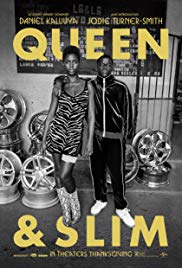
QUEEN AND SLIM
US, 2019, 132 minutes, Colour.
Daniel Kaluuya, Jodie Turner- Smith, Bokeem Woodbine, Chloe Sevigny, Flea. Sturgill Simpson, Indya Moore.
Directed by Melina Matsoukas.
The title is something of an enigma because the two central characters are never referred to as Queen or as Slim during the whole film. In fact, the newspaper reports their names as Ernest Hines and Angela Johnson. Be that as it may, they turn out to be unexpectedly interesting characters.
There is a lot of cross reference to them as a contemporary Bonnie and Clyde. While they do get entangled with the police and are pursued across America, they are not outlaws in the sense of Bonnie and Clyde. Another helpful reference might be to The Odd Couple. This is a strong African- American film, the central couple, the screenwriter and the director (although Daniel Kaluuya is a British actor).
This is a road movie, Queen (Jodie Turner- Smith both forceful and vulnerable) and Slim (Daniel kill Kaluuya from Get Out and Black Panther) driving through Ohio, Kentucky, Louisiana, Alabama, Georgia, Florida. The initial emphasis is on the odd couple, two strangers meeting on a date in a diner, he a rather ordinary citizen, devoted to his father, she a lawyer whose recent client has just been executed. They seem to have very little in common and the date is a flop. However, in a moment of lapse in driving, they are pulled over by an aggressive cop, obnoxiously racist, who draws a gun – and, in the consequence scuffle, Queen is shot in the leg and then shoots the cop.
The dilemma. To wait for the police? To drive off and escape? However, the cop had phoned in to headquarters the details of the case. And so, the pursuit is on.
What follows is the drama on the road but there are a whole lot of incidental anecdotes along the way which makes the pursuit and escape more telling. The car breaking down, their being helped by the local sheriff, taking his car. They encounter a young man at a service station shop who just wants to hold their gun. When their next car breaks down, they take it to a garage, the owner knowing who they are, but his young son coming in, facing them as heroes, and his going to a race rally the next day and violently confronting a policeman in a rage.
But, the main stop is with Queen’s uncle, whom she had defended in court, a Vietnam veteran, running a group of girls in Louisiana. But, while they change their appearance, the police are on to them and the uncle (Bokeem Woodbine) gives them a car and a reference to a buddy he fought within Vietnam.
As they travelled to this contact, they stop at a bar, live music, they dance, are recognised and supported. Then, in their exhilaration, Queen sits on the front seat window exhilarated with her arms in the air in the wind, eventually persuading Slim to do the same thing. They arrive at the friend’s house, hide, then escape, flying to Florida to get a plane which will fly them out of the country.
It is no spoiler to say that they do not succeed. There is quite some pathos at the brutality of the ending – and there are certainly more than echoes of Bonnie and Clyde.
1. The title? The characters and their actual names? The nicknames?
2. An American road movie, Ohio, Kentucky, Louisiana, Alabama, Georgia, Florida? The wide range of scenery? The wide range of people?
3. The musical score, American styles?
4. The plausibility credibility of the plot? The characters and their backgrounds? The different personalities, the differences, ages, experience? Audience empathy with them or not?
5. The initial date, the restaurant, the decision about the date, the choice? The conversation, Queen, lawyers, the execution case? Slim, ordinary, his family, his father? The connecting or not?
6. The drive, talk, the swerve, held up by the police, the harsh behaviour, calling in the case, the policeman is racism, the gun, the fight, his wounding Queen, Slim shooting him?
7. The dilemma, the moral choice, energy or not? Slim wanting to find his father? Not? Leaving, the plan?
8. Out of gas, thumbing a lift, the sheriff, helping them with the petrol, his recognition, the gun, their putting him in the boot of the car? Taking the car? Leaving their own with the sheriff?
9. Travel, sleep, tensions, radio, music, the need for food?
10. Stopping at the supermarket, the assistant and his wanting to handle the gun?
11. Louisiana, Uncle Earl? The back story, his accidentally killing his sister, Queen defending him, his experience in Vietnam, post-traumatic stress? The girls, his running them? The decision to stay, the need for cash? The reference to Mr Shepherd and their war service?
12. The girls, friendly, knowing and understanding Earl? Shaving Slim’s head? Changing Queen’s appearance? The police the house? Burning the sheriff’s car?
13. Slim and taking the opportunity to phone his father, the police with his father, the father hanging up and not helping?
14. The developing relationship between the two, Queen and her mellowing, Slim and his taking more responsibilities, the attraction, the sexual encounter?
15. Earl giving the car, their driving, going to the live music, dancing, Queen mellowing, the people recognising them but protecting them?
16. The garage, fixing the car, the payment, the mechanic’s son, his attitudes, defying the police, going to the protest, his behaviour, the fierce defiance, shooting the policeman
in the face? His father’s grief?
17. Arriving at the Shepherd’s house, the wife hesitant, Shepherd and his help, the interruptions of the meal, the hiding under the bed, the searching the house? The decision to jump from the window, Slim helping Queen and her shoulder? The garage, the car, the black policeman letting them go?
18. Driving to Florida, the exhilaration, the window and sitting on it, the freedom and exhilaration?
19. The connection in Florida, demanding the plane instantly, arriving at the airport, the police cars, defying them, Queen shot, Slim carrying her, their deaths?
20. The man and his taking the reward and counting the money?
21. The funeral, the grief, Slim’s father?
22. The further glimpses of all the other characters in the aftermath?
23. The background of police killing black victims, demonstrations against these killings, the consequences?
Published in Movie Reviews
Published in
Movie Reviews
Saturday, 09 October 2021 13:01
Lucy in the Sky
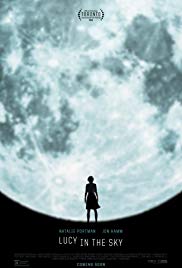
LUCY IN THE SKY
US, 2019, 125 minutes, Colour.
Natalie Portman, Jon Hamm, Dan Stevens, Ellen Burstyn,
Directed by Noah Hawley.
This story about space exploration has some strong credentials. It has a starring role for Natalie Portman, interesting supporting cast including Jon Hamm, Dan Stevens and Ellen Burstyn.
The title refers to the Beatles’ song, Lucy in the Sky with Diamonds. The original song had drug and hallucinatory references – and the screenplay suggests that being an astronaut has mind-altering dimensions and repercussions.
However, the film does not meet its expectations and many audiences will find it very long, puzzling, and at times not particularly interesting.
Natalie Portman is Lucy, an astronaut who is exhilarated by her experience and finds it very difficult when she comes back to earth. The space experiences have mind-altering effects, emotion-altering effects, which is immediately apparent in the cooling of her relationship with her non-comprehending husband, Dan Stevens.
There are difficulties with the authorities in terms of her wanting to go to space again and their not considering her ready, making demands on her for other jobs, and this creates further debilitating effects on her psyche. Jon Hamm plays one of the space team – and Lucy begins an affair with him only to find that he is not to be trusted especially in terms of her going back into space and not to be trusted in terms of relationships.
Also present in Lucy’s life is her grandmother, played by Ellen Burstyn, as well is a niece whom she virtually adopts and makes a participant in her emotional upheavals.
Unfortunately for the director, making a cinema debut, although successful with TV episodes of Legion and Fargo, the film received very unfavourable reviews and very little release.
1. The title, the Beatles song? Applications?
2. Stay story, exploration of space? The astronauts? An earth story, interconnecting the space experience with ordinary experience? To the detriment of the earth story?
3. The space sequences, the vehicle, Lucy, her exhilaration? Landing? The after effects?
4. Lucy, her age, character, space training, her reputation, her relationship with her husband, the tension, her becoming bored?
5. Lucy affected by the space experience, alienated, her friendship with Mark, sharing, talking, the attraction, the beginning of the affair, the consequences? Her mistrust of Mark, his relationship with Karen? Her demanding he stop the affair? His denials? Going into his computer, discovery of the continued affair? His letter urging Lucy not to be accepted for the space program?
6. Her not going to space, discussions with the authorities, the various jobs?
7. Lucy and her relationship with her grandmother, a tough type, advice, her death? The funeral?
8. Lucy and her niece, the friendship, her caring for her, getting her niece to make decisions, going with her?
9. The alienation from her husband, his bewilderment?
10. Mark going into space, his success, the impact on Lucy?
11. Lucy and her change, mental condition, violent attitudes, taking her niece, going on the road, the aggression, her being taken?
12. Three years later, the space program, her niece, Lucy and her beekeeping? An enigmatic ending?
Published in Movie Reviews
Published in
Movie Reviews
Saturday, 09 October 2021 13:01
Invisible Man, The/ 2020
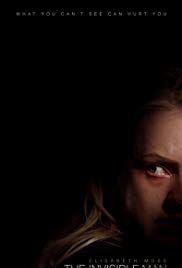
THE INVISIBLE MAN
US/Australia, 2020, 124 minutes, Colour.
Elisabeth Moss, Aldis Hodge, Harriet Dyer, Oliver Jackson- Cohan, Storm Reid, Michael Dorman.
Directed by Lee Whannel.
Novelist H.G.Wells is best known for his science fiction stories, War of the Worlds, Things to Come, The Time Machine. But he also wrote the imaginative The Invisible Man. It was filmed, became something of a horror classic with Claude Rains in the 1930s. Since then, there have been a variety of remakes, updates, spoofs…
So, here is a 21st-century version certainly updated, a lavish San Francisco setting (with some local photography for the atmosphere of the city and its surroundings but the action filmed in Sydney). In Wells’s novel and in the first film, the invisible man concealed himself in order to gain absolute control, no limits to his world. In this current version, there is a focus on control but this time of a mad scientist dominating his wife. And, that’s how it begins, with the wife escaping from her home, a wealthy mansion, then her husband in pursuit. Then comes news of his suicide, but…
Critics and box office tended to agree that the film works well. It might have become more successful around the world (over $100 million) but its release was cut short by covid-19 and it went to streaming sources.
While the film is basically the brainchild of the novelist, this version is also the brainchild of an Australian cinema whiz kid (now in his early 40s), Leigh Whannell. With his writer-director friend, James Wan, they establish the Saw franchise when they were in their mid-to-late 20s. While Whannell has continued as an actor and a prolific screenwriter, especially with the Insidious series, he also directed a small-budget horror film, well worth catching, Upgrade.
Elisabeth Moss, a strong screen presence in many films and, of course, with The Handmaid’s Tale, is Cecilia, the wife who flees from her husband, asks for refuge from her sister who tends to be hostile, is supported by a San Francisco police officer, obtaining help also from his student daughter.
The atmosphere continues to be heightened as the husband uses his scientific and technological knowledge to create a suit which renders him invisible, his wife having intimations of his presence, bewildering physical contact while he is unseen, and then some mad attempts at wrecking violence on those who support her.
The film is often in bright light and colour, widescreen, not necessarily the atmosphere for such horror, but it all works very effectively.
Cecilia can take only so much and, the latter part of the film sees her fighting back, confronting her husband, discovering his invention of the suit in their mansion, and, of course, exploiting it against her husband.
As they say, when alerting potential audiences who may not like this kind of horror thriller, “very good of its kind�.
1. The title? The classic novel by H.G.Welles? The film tradition – serious and spoofs?
2. 21st-century update? A re-imagining, the shift of emphasis, the aggressive male and sexual violence towards women?
3. The locations, the lavish home, San Francisco? The Golden Gate and other sights?
4. Adrian as a character, his situation, marriage, clashes, his success at optics, Cecilia leaving, the news of his suicide? His experiments, his suit, invisibility and the consequences? His malice?
5. Cecilia, in herself, age and experience, married to Adrian, love/not? The initial escape, driving him, the dog, out on the road? His pursuit?
6. The atmosphere San Francisco, luxury homes, restaurants, offices, police precincts?
7. The range of the musical score, instruments, intensity?
8. Cecilia, waking, running, Zeus, the car, her sister, Adrian’s pursuit, losing her pills? Emily taking her home, James and Sidney? Refuge? Her fears and not going out?
9. Emily and the tensions between the two sisters? Emily living away? James, police, agreeable? Sidney, her age, wanting to go to the University?
10. Tom, the meeting with him in his office, the will and the conditions, the limits for Cecilia but the grant of money? Cecilia giving the cheque to Sidney? Questioning Adrian’s
suicide, the urn with the ashes?
11. Cecilia, sense of another presence, increasing, the various impressions, indications, the effect of fear?
12. Her not being believed, the various reactions? Sidney being hit, James upset? Blaming Cecilia?
13. The range of episodes, Adrian and his haunting Cecilia, her going to the attic, the ladder, the brutality of his physically attacking Cecilia?
14. Cecilia to the house, discovering the suit, his pursuit, the violent encounter?
15. Emily, the condemnatory email, Emily slamming the door on Cecilia? The later reconciliation, in the restaurant, the sudden slashing of her throat? Cecilia with the knife?
16. Cecilia arrested, in the hospital, the interrogations, James and his role? The madness with Adrian’s presence? The massacring of the staff?
17. Cecilia and her escape, phoning James, the threat to Sidney, leading to the climax of the house, Adrian and his brutality towards Sidney, bashing James? The discovery that the presence in the suit was Tom?
18. Adrian, by contrast, locked up, denying everything, Cecilia coming, well-dressed, the dinner, saying she would come back to him if he told the truth? His continued denials?
19. Cecilia, with the suit, slashing Adrian? The surveillance cameras? Her engineering her attack on him? Her walking out, James and his response? Her future?
Published in Movie Reviews
Published in
Movie Reviews